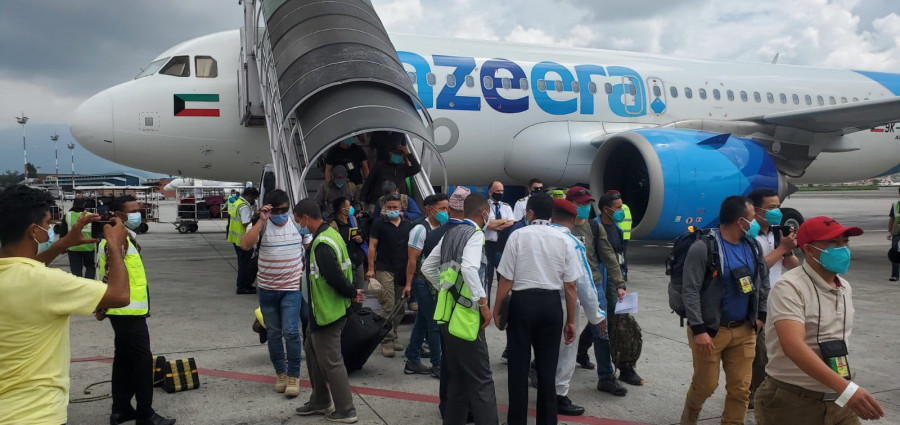National
Nepal to wrap up evacuation of its citizens from Afghanistan on September 18
Officials say 906 Nepali nationals have returned from Afghanistan as of Thursday.
Anil Giri
The government is preparing to wrap up the evacuation of its citizens from crisis-ridden Afghanistan on September 18.
“We are bringing back as many as 134 Nepali nationals from Afghanistan on a chartered flight from Kabul on September 18,” Ram Prasad Subedi, deputy chief of mission at the Nepali Embassy in New Delhi, told the Post over the phone.
The embassy in Delhi is currently accredited to Afghanistan.
“This marks our final evacuation from Afghanistan as some Nepalis working in various US agencies and United Mission in Afghanistan will remain there as they are safe and working inside the Green Zone,” said Subedi.
It is estimated that around 300 Nepali nationals working in various UN agencies will be left in Afghanistan after the September 18 evacuation.
As of Thursday, 100 Nepali nationals working in various UN agencies in Kabul and 34 Nepali nationals living and working illegally in Afghanistan have confirmed that they are returning to Nepal on September 18, said Subedi.
The 100 Nepalis are returning on their annual leave and the remaining 34 are the final batch of Nepali nationals working inside Afghanistan who will be brought home on Iran's Mahan Air.
Some Nepalis working in the UN agencies are reportedly coordinating the flight and the returnees will have to pay the airfares themselves.
After the Taliban seized power in Kabul following years long infighting, hundreds of thousands foreign nationals and Afghan people started leaving Afghanistan fearing that the situation could turn worse.
In the initial days, Nepal struggled to evacuate its citizens since it did not have its diplomatic presence in the country and government-to-government communication was almost dead with the Taliban wresting control of Afghanistan.
The Sher Bahadur Deuba government then formed a task force headed by Harish Chandra Ghimire, joint secretary at the Ministry of Foreign Affairs, to take prompt action to repatriate Nepalis from Afghanistan.
“We wrote to various employers in Afghanistan employing our citizens to keep Nepali citizens safe and create an environment for their safe return,” a senior Foreign Ministry official told the Post. “We also wrote to several diplomatic missions in Kabul to send back our citizens at their own expenses.”
But without an accurate figure on the number of Nepalis living and working in Afghanistan, it was difficult for the Nepali authorities to coordinate and conduct the evacuation.
“There were contradicting figures on the number of Nepali citizens provided by our embassy in New Delhi and the Department of Foreign Employment,” said the official at the Foreign Ministry. “We did have figures on the number of Nepalis working at various diplomatic missions and UN agencies in Kabul, but we had no idea how many undocumented Nepalis were living and working in Afghanistan.”
It was only after the Nepalis living in Afghanistan and their families were urged to register their names and addresses that the authorities came up with an estimated figure (1,500) of stranded Nepali citizens.
According to the Department of Foreign Employment, in the last fiscal year, ending mid-July, 1,073 Nepalis had obtained labour permits to work in Afghanistan. The department’s records show that in the last seven years, more than 8,000 Nepalis have been issued labour permits for Afghanistan.
But there are no figures of the undocumented Nepali workers, and estimates suggest there could be more than 14,000.
Afghanistan is one of the key countries, despite high risk, where Nepalis prefer to go due to high pay. But government agencies did not have the data on how many Nepalis have returned from Afghanistan.
Ghimire told the Post that as of Thursday 906 Nepali nationals have returned from Afghanistan.
After the government’s request, those who had employed the Nepali citizens started sending them back and some undocumented Nepali nationals returned on their own expanses.
“Those working in the UN agencies will remain in Afghanistan and they are safe. Their number is around 300,” said Ghimire.




 8.22°C Kathmandu
8.22°C Kathmandu














